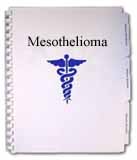|
Mesothelioma and Lung Cancer News - Return to Menu
New treatment options for some difficult cancers improve survival and quality of life
WINSTON-SALEM, N.C. - 5-Mar-2005 – Researchers at Wake Forest University Baptist Medical Center have shown that surgery combined with inserting heated chemotherapy drugs directly into the abdomen can improve survival rates and quality of life in patients with several cancers that historically have a poor prognosis.
Results of four separate studies are being presented at the Society of Oncology Surgeons national meeting March 3-5 in Atlanta.
The types of cancer reported at the meeting that have been treated with a combination of surgery and intraperitoneal hyperthermic chemotherapy (IPHC) are tumors of the abdominal cavity that have spread from the appendix, small bowel and advanced ovarian cancer.
The technique is also useful for tumors that have spread from the colon, rectum, stomach as well as well as mesothelioma of the abdominal cavity.
Peritoneal cancer -- cancer of the lining of the abdominal wall -- is a very common cause of death in patients with cancers in the abdomen. Surgery alone has proven to have limited effectiveness, as has radiation therapy and systemic chemotherapy. These new studies show that the combination of surgery and IPHC improves overall survival and quality of life in these selected patients.
"Patients with peritoneal cancer that has spread from the small bowel represent both a unique diagnostic and treatment challenge," said Perry Shen, M.D., assistant professor of surgical oncology and lead author of one of the studies. Attempts to treat this cancer with systemic chemotherapy and conventional surgery have not been successful.
The patients in this study had a mean survival of 45.1 months, compared to 3.1 months for patients who received only traditional treatment.
"While further study is needed on the effects of surgery and IPHC with other treatments," said Shen, "the data from this study suggest that this combination seems to be an effective and attractive option in a very difficult situation."
In a study of patients with tumors in the abdominal cavity which have spread from tumors of the appendix, data from John Stewart, M.D., instructor in surgery, show that long-term survival is anticipated in the majority of patients with low grade tumors who are treated with surgery and IPHC. High grade lesions result in significantly lower survival rates even with this treatment. High grade and low grade refer to the stage of malignancy.
A study of patients with advanced ovarian cancer showed that it is responsive to a combination of surgery and IPHC. The treatment plan could also include systemic chemotherapy. Additional IPHC treatment was feasible during subsequent reassessment surgery.
"Surgery combined with IPHC seems to be a life extending and enhancing treatment option for patients with some of the most difficult cancers," said Edward Levine, MD, professor and head of surgical oncology at Wake Forest Baptist. The positive results of these studies support the need for further evaluation of the use of IPHC and surgery in the treatment of other metastatic cancers of the abdomen.
###
Media Contacts: Jonnie Rohrer, jrohrer@wfubmc.edu, 336-716-6972; Shannon Koontz, shkoontz@wfubmc.edu, or Karen Richardson, krchrdsn@wfubmc.edu, at 336-716-4587.
About Wake Forest University Baptist Medical Center: Wake Forest Baptist is an academic health system comprised of North Carolina Baptist Hospital and Wake Forest University School of Medicine. It is licensed to operate 1,282 acute care, psychiatric, rehabilitation and long-term care beds and is consistently ranked as one of "America's Best Hospitals" by U.S. News & World Report.
Contact: Jonnie Rohrer
jrohrer@wfubmc.edu
336-716-4587
Wake Forest University Baptist Medical Center
|

































